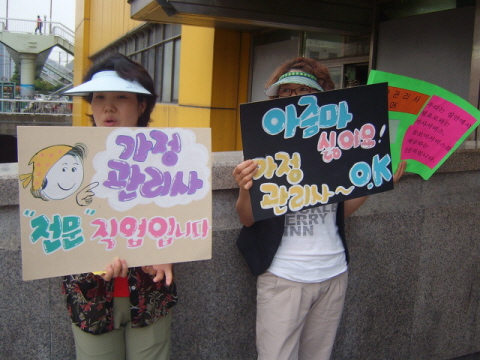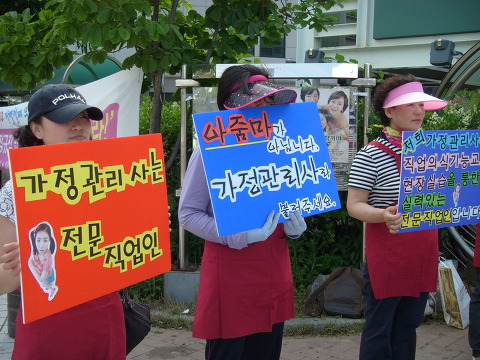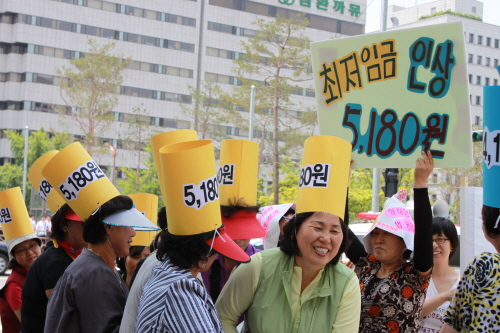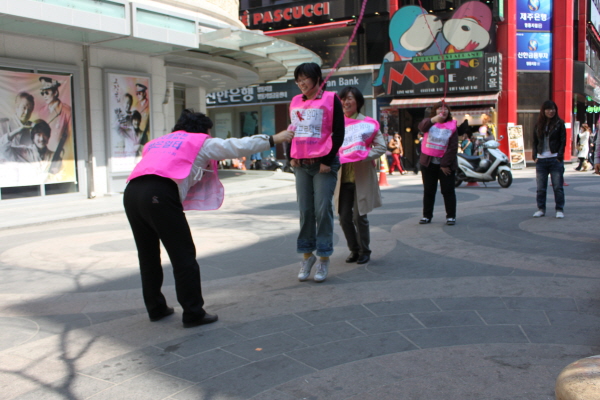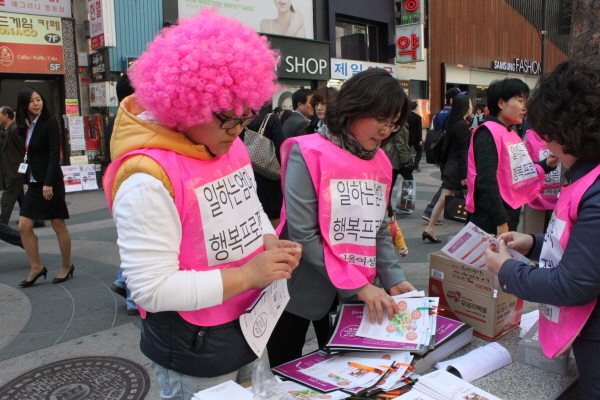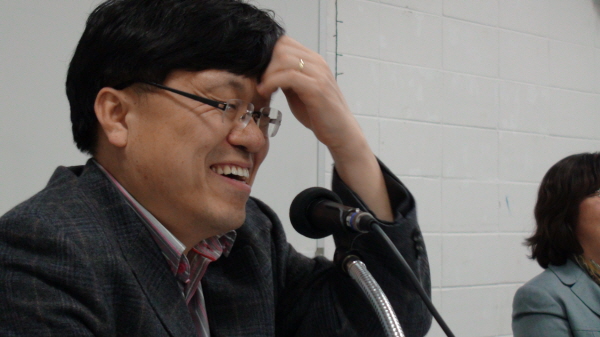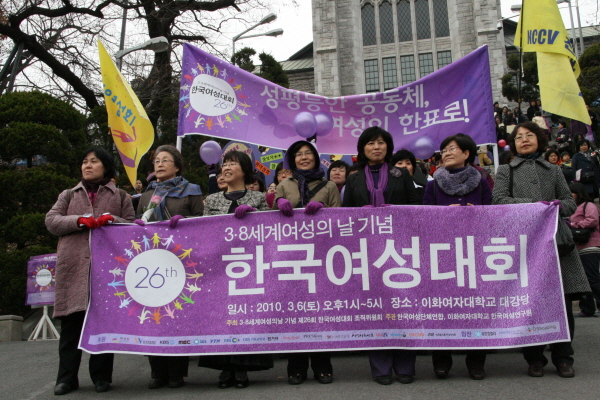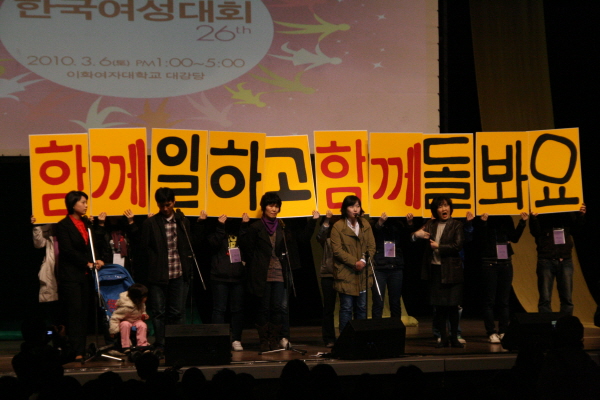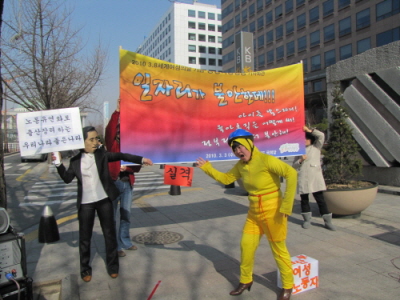The convention was held under the theme of “make
our hope real with women’s participation” in the auditorium of Ewha Womans
University on March 6.
It urged women’s participation and the need
of the society’s constant concern and support for ‘a gender equality community
with a woman’s vote,’ ‘a society where people work and care together,’ and ‘a society
without poverty and violence.’
The ‘Colorful Free Market’ was held before
the convention in front of the auditorium. Participating organizations prepared
various booths to publicize their agenda, to increase membership, and to fund
raise by selling products of self-support communities.
The convention started at 2:00 pm with
about 1,000 participants. It was presided over by Actor Kwon Haeyo, public
relations ambassador for the Korean Women’s Association United (KWAU), and Ms. Choe Gwanggi,
professional master of ceremonies. An opening speech was given by Ms. NamYoon
Insoon, KWAU standing representative, and Ms. Park Youngmi, KWAU
co-representative. They said, “Let us make a beautiful solidarity by overcoming
sarcasm and division, and understanding and embracing each other’s differences
with open minds. Let us make our hope real with our participation. We wish to
meet you where hope is formed and reality is changed.”
After the open speech, there were the
congratulatory messages by Lee Hakyeong, co-representative of the Civil
Society Organizations Network in Korea and O Iseul, dean of college of
social sciences of Duksung Women’s University, the presentation on gender
equality hindrance 2010 & the steppingstone award for the gender equality
2010, the announcement performance on ‘the campaign to work and care together,’
the congratulatory show by Singer Heo Dalrim, and reading of the women’s
declaration in commemoration of the International Women’s Day.
After the ceremony in the auditorium, about
500 activists and members from member organizations held a world women’s parade
under the theme of “for the world without poverty and violence.” They marched
from Ewha Womans University to Changchon Park in Sinchon. There were three
topics for the convention: ‘a gender equality community with a woman’s vote,’ ‘a
society where people work and care together,’ and ‘a society without poverty
and violence.’ At the parade, members wore purple, yellow, and red clothes,
representing the three topics, and publicized our demands.
3.8 Women’s Declaration
Make
our hope real with women’s participation
How many people feel happy in our society
nowadays? Everyone has a simple hope according to her/his own circumstances.
However, the current state of our society hardly allows ordinary people even to
take simple hopes because the society is changing like a world where the
polarization is getting severe, communities are collapsing, and the winner
takes all as the law of the jungle prevails.
Raising children well, house ownership for
not flitting around, stable jobs, security for the aged, physical fitness, a
sensible amount of leisure time, and so on were ordinary people’s wishes.
However, today those wishes belong to only special people.
What is the life of women in our society?
Even though people prefer a girl to a son and say ‘a properly brought-up
daughter is worth more than ten sons,’ daughters after their graduation from
university are unemployed or get married instead of getting jobs. The term ‘alpha
girl’ is applicable to only a small fraction of women. Most women have
difficulty in getting jobs. Even though they find jobs, many of them are
employed as irregular workers who are easily dismissed for marriage and
pregnancy. Many women take care of children at home because they cannot find jobs.
They want and need to work, but they are forced into the house. Stable jobs are
required for childbirth and childcare. Hiding their heads in the sand, the
government and the pro-life doctors insist the eradication of abortion.
However, it is like that they kill women twice.
Now we women try to change the polarized
society neglecting and excluding socially underprivileged people and minority
groups. We will build solidarity and exercise the rights of democratic citizens
justly for making together the society happy instead of being isolated
individually and resentful of our situation.
Gender
equality community with a woman’s vote
Candidates who interact with local people,
propose necessary policies in life of local people, and suggest measures with
which the local community is able to participate in solving the local problems,
should be elected for the coming June nationwide local election. In particular,
it will be the first step toward the realization of a gender equality community
to choose candidates who are capable of making and carrying out policies for
stable jobs for women, making men to share the responsibility of household
affairs with women, the solution to the feminization of poverty, and the
security of women. Let us completely change the local self governments with
women’s votes.
Society
where people work and care together
Women workers are dismissed first in the
economic crisis and women of all ages have difficulty in finding jobs. Even
working women still carry the primary responsibility of childcare or household
affairs. In a general trend of husband and wife both working, Korean men and
women work the longest hours in the world, and a woman is forced to be a
superwoman who is able to do many things successfully at the same time such as
have a job, bring up children and care for her home.
To make the society where women and men
both have stable jobs and bring up children together, it should be realized
that unfair dismissals for pregnancy, childbirth, and childcare are eradicated,
public childcare facilities and afterschool childcare programs are increased,
the long working hours and the excessive get-together culture of the company
are improved, pay during childcare leave and the right of male workers to take
childcare leave are increased, and so on. With women’s active participation,
let us make the society where women and men both work and care together.
Society
without poverty and violence
The poverty of women is getting severe and
the violence against women and children is increasing. However, the government
is consistent in adopting stopgap measures. The government should prepare
measures to toughen penalties for perpetrators in order to protect women and
children from violence occurring at home, school, park, public restroom, etc.
and to prevent the recurrence of those crimes. It should also provide a safe neighborhood
environment. To solve the problem of the feminization of poverty, it should
prepare measures to give vocational trainings to irregular female workers with
interrupted careers, to create jobs for those women, and to support the self
reliance of socially underprivileged people such as single mothers, migrant
women, and disabled women. Let us win a safe society without poverty and
violence by the women’s power.
March
6, 2010
Participants
of
the
26th Korean Women’s Convention in commemoration of the International Women’s
Day
